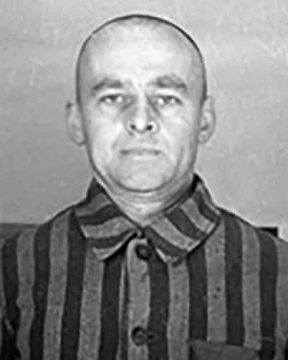PD Smith in The Guardian:
 Just after Witold Pilecki’s arrival at Auschwitz concentration camp in September 1940, Deputy Commandant SS-Hauptsturmführer Karl Fritzsch addressed the 5,000 prisoners: “Your Poland is dead forever and now you are going to pay for your crimes through work,” he declared. “Look there, at the chimney. Look!” he shouted. “This is the crematory. Three thousand degrees of heat. The chimney is your only way to freedom.” In case anyone had not got the message, guards then beat a man senseless with clubs in front of them all. A former cavalry officer in the Polish army, Pilecki was a member of the resistance in Warsaw. When news reached them in July 1940 that a concentration camp had been opened in a former Polish army barracks near the town of Oświęcim, Pilecki volunteered to be captured and taken to the camp – which the Germans called Auschwitz – in order to gain intelligence about what was happening there and to organise a break out. Few men had returned alive from Auschwitz and it was an incredibly brave decision. When a prisoner learned that Pilecki had volunteered to be there he was astonished: “If what you say is true you’re either the greatest hero or the biggest fool.”
Just after Witold Pilecki’s arrival at Auschwitz concentration camp in September 1940, Deputy Commandant SS-Hauptsturmführer Karl Fritzsch addressed the 5,000 prisoners: “Your Poland is dead forever and now you are going to pay for your crimes through work,” he declared. “Look there, at the chimney. Look!” he shouted. “This is the crematory. Three thousand degrees of heat. The chimney is your only way to freedom.” In case anyone had not got the message, guards then beat a man senseless with clubs in front of them all. A former cavalry officer in the Polish army, Pilecki was a member of the resistance in Warsaw. When news reached them in July 1940 that a concentration camp had been opened in a former Polish army barracks near the town of Oświęcim, Pilecki volunteered to be captured and taken to the camp – which the Germans called Auschwitz – in order to gain intelligence about what was happening there and to organise a break out. Few men had returned alive from Auschwitz and it was an incredibly brave decision. When a prisoner learned that Pilecki had volunteered to be there he was astonished: “If what you say is true you’re either the greatest hero or the biggest fool.”
Pilecki quickly began organising an underground network in Auschwitz, but conditions were far worse than he had imagined. There were constant beatings, humiliations and a starvation diet, all designed to break down bonds between prisoners and to destroy them psychologically as well as physically. According to Pilecki, “some slithered into a moral swamp. Others chiselled themselves a character of finest crystal.” He was certainly in the latter group. By October prisoners were dying at the rate of about a dozen a day. Pilecki managed to smuggle a message out to the resistance in Warsaw about the “monstrous torture” being endured by prisoners. He was confident they would act. On Christmas Eve the guards put up a tree in the camp festooned with lights: “For a joke, the SS had stacked as presents under the tree the bodies of prisoners who had died that day in the penal company, mostly Jews.”
More here.
